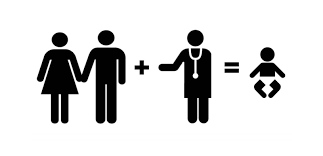Infertility refers to an inability to conceive after having regular unprotected sex. Infertility can also refer to the biological inability of an individual to contribute to conception, or to a female who cannot carry a pregnancy to full term. In many countries infertility refers to a couple that has failed to conceive after 12 months of regular sexual intercourse without the use of contraception.
Studies indicate that slightly over half of all cases of infertility are a result of female conditions, while the rest are caused by either sperm disorders or unidentified factors.

Study shows that:
- About 20% of cases of infertility are due to a problem in the man.
- About 40% to 50% of cases of infertility are due to a problem in the woman.
- About 30% to 40% of cases of infertility are due to problems in both the man and the woman.
Many cases of apparent infertility are treatable. Infertility may have a single cause in one of the partners, or it could be the result of a combination of factors.
Risk factors of infertility
In medicine, a risk factor is something that raises the risk of developing a condition, disease or symptom. For example, obese people are more likely to develop diabetes type 2 compared to people of normal weight; therefore, obesity is a risk factor for diabetes type 2.
Age – a woman’s fertility starts to drop after she is about 32 years old, and continues doing so. A 50-year-old man is usually less fertile than a man in his 20s (male fertility progressively drops after the age of 40).
Smoking – smoking significantly increases the risk of infertility in both men and women.  Smoking may also undermine the effects of fertility treatment. Even when a woman gets pregnant, if she smokes she has a greater risk of miscarriage.
Smoking may also undermine the effects of fertility treatment. Even when a woman gets pregnant, if she smokes she has a greater risk of miscarriage.
Alcohol consumption – a woman’s pregnancy can be seriously affected by any amount of alcohol consumption. Alcohol abuse may lower male fertility. Moderate alcohol consumption has not been shown to lower fertility in most men, but is thought to lower fertility in men who already have a low sperm count.
Eating disorders – women who become seriously underweight as a result of an eating disorder may have fertility problems.
Being vegan – if you are a strict vegan you must make sure your intake of iron, folic acid, zinc and vitamin B-12 are adequate, otherwise your fertility may become affected.
Over-exercising – a woman who exercises for more than seven hours each week may have ovulation problems.
Not exercising – leading a sedentary lifestyle is sometimes linked to lower fertility in both men and women.
Sexually transmitted infections (STIs) – chlamydia can damage the fallopian tubes, as well as making the man’s scrotum become inflamed. Some other STIs may also cause infertility.
Exposure to some chemicals – some pesticides, herbicides, metals (lead) and solvents have been linked to fertility problems in both men and women.
Mental stress – studies indicate that female ovulation and sperm production may be affected by mental stress. If at least one partner is stressed it is possible that the frequency of sexual intercourse is less, resulting in a lower chance of conception.
Causes of infertility in women
There are many possible causes of infertility. Unfortunately, in about one-third of cases no cause is ever identified.
Ovulation disorders
Problems with ovulation are the most common cause of infertility in women, experts say. Ovulation is the monthly release of an egg. In some cases the woman never releases eggs, while in others the woman does not release eggs during come cycles.
Ovulation disorders can be due to:
- Premature ovarian failure – the woman’s ovaries stop working before she is 40.
- PCOS (polycystic ovary syndrome) – the woman’s ovaries function abnormally. She also has abnormally high levels of androgen. About 5% to 10% of women of reproductive age are affected to some degree. Also called Stein-Leventhal syndrome.
- Hyperprolactinemia – if prolactin levels are high and the woman is not pregnant or breastfeeding, it may affect ovulation and fertility.
- Poor egg quality – eggs that are damaged or develop genetic abnormalities cannot sustain a pregnancy. The older a woman is the higher the risk.
- Overactive thyroid gland
- Underactive thyroid gland
- Some chronic conditions, such as AIDS or cancer.

Problems in the uterus or fallopian tubes
The egg travels from the ovary to the uterus (womb) where the fertilized egg grows. If there is something wrong in the uterus or the fallopian tubes the woman may not be able to conceive naturally. This may be due to:
- Surgery – pelvic surgery can sometimes cause scarring or damage to the fallopian tubes. Cervical surgery can sometimes cause scarring or shortening of the cervix. The cervix is the neck of the uterus.
- Submucosal fibroids – benign or non-cancerous tumors found in the muscular wall of the uterus, occurring in 30% to 40% of women of childbearing age. They may interfere with implantation. They can also block the fallopian tube, preventing sperm from fertilizing the egg. Large submucosal uterine fibroids may make the uterus’ cavity bigger, increasing the distance the sperm has to travel.
- Endometriosis – cells that are normally found within the lining of the uterus start growing elsewhere in the body.
- Previous sterilization treatment – if a woman chose to have her fallopian tubes blocked. It is possible to reverse this process, but the chances of becoming fertile again are not high.
Medications
Some drugs can affect the fertility of a woman. These include:
- NSAIDs (non-steroidal anti-inflammatory drugs) – women who take aspirin or ibuprofen long-term may find it harder to conceive.
- Chemotherapy – some medications used in chemotherapy can result in ovarian failure. In some cases, this side effect of chemotherapy may be permanent.
Radiotherapy
If radiation therapy was aimed near the woman’s reproductive organs there is a higher risk of fertility problems.
Illegal drugs
Some women who take marijuana or cocaine may have fertility problems.
Causes of infertility in men
The following are common causes of infertility in men.
Semen

Semen is the milky fluid that a man’s penis releases during orgasm. Semen consists of fluid and sperm. The fluid comes from the prostate gland, seminal vesicle and other sex glands.
The sperm is produced in the testicles. During orgasm a man ejaculates (releases semen through the penis). The seminal fluid helps transport the sperm during ejaculation. The seminal fluid has sugar in it – sugar is an energy source for sperm.
Abnormal semen is responsible for about 75% of all cases of male infertility. Unfortunately, in many cases doctors never find out why. The following semen problems are possible:
- Low sperm count (low concentration) – the man ejaculates a lower number of sperm, compared to other men. Sperm concentration should be 20 million sperm per milliliter of semen. If the count is under 10 million there is a low sperm concentration (subfertility).
- No sperm – when the man ejaculates there is no sperm in the semen.
- Low sperm mobility (motility) – the sperm cannot “swim” as well as it should.
- Abnormal sperm – perhaps the sperm has an unusual shape, making it more difficult to move and fertilize an egg.
Sperm must be the right shape and able to travel rapidly and accurately towards the egg. If the sperm’s morphology (structure) and motility (movement) are wrong it is less likely to be able to reach the egg and fertilize it.
Causes of abnormal semen
- Testicular infection
- Testicular cancer
- Testicular surgery
- Overheating the testicles – frequent saunas, hot tubs, very hot baths, or working in extremely hot environments can raise the temperature of the testicles. Tight clothing may have the same effect on some people.
- Ejaculation disorders – for some men it may be difficult to ejaculate properly. Men with retrograde ejaculation ejaculate semen into the bladder. If the ejaculatory ducts are blocked or obstructed the man may have a problem ejaculating appropriately.
- Varicocele – this is a varicose vein in the scrotum that may cause the sperm to overheat.
- Undescended testicle – one (or both) testicle fails to descend from the abdomen into the scrotum during fetal development. Sperm production is affected because the testicle is not in the scrotum and is at a higher temperature. Healthy sperm need to exist in a slightly lower-than-body temperature. That is why they are in the scrotum, and not inside the body.
- Hypogonadism – testosterone deficiency can result in a disorder of the testicles.
- Genetic abnormality – a man should have an X and Y chromosome. If he has two X chromosomes and one Y chromosome (Klinefelter’s syndrome) there will be an abnormal development of the testicles, low testosterone, and a low sperm count (sometimes no sperm at all).
- Mumps – this viral infection usually affects young children. However, if it occurs after puberty inflammation of the testicles may affect sperm production.
- Hypospadias – the urethral opening is at the underside of the penis, instead of its tip. This abnormality is usually surgically corrected when the male is a baby. If it is not the sperm may find it harder to get to the female’s cervix. Hypospadias occur in about 1 in every 500 newborn boys.
- Cystic fibrosis – Cystic fibrosis is a chronic disease that affects organs such as the liver, lungs, pancreas, and intestines. It disrupts the body’s salt balance, leaving too little salt and water on the outside of cells and causing the thin layer of mucus that usually keeps the lungs free of germs to become thick and sticky. This mucus is difficult to cough out, and it clogs the lungs and airways, leading to infections and damaged lungs. Males with cystic fibrosis commonly have a missing or obstructed vas deferens (tube connecting the testes to the urethra; it carries sperm from the epididymis to the ejaculatory duct and the urethra).
- Radiotherapy – radiation therapy can impair sperm production. The severity usually depends on how near to the testicles the radiation was aimed.
- Some diseases – the following diseases and conditions are sometimes linked to lower fertility in males: Anemia, Cushing’s syndrome, Diabetes, Thyroid disease.
Do you need consultation and treatment on infertility? Click here.





